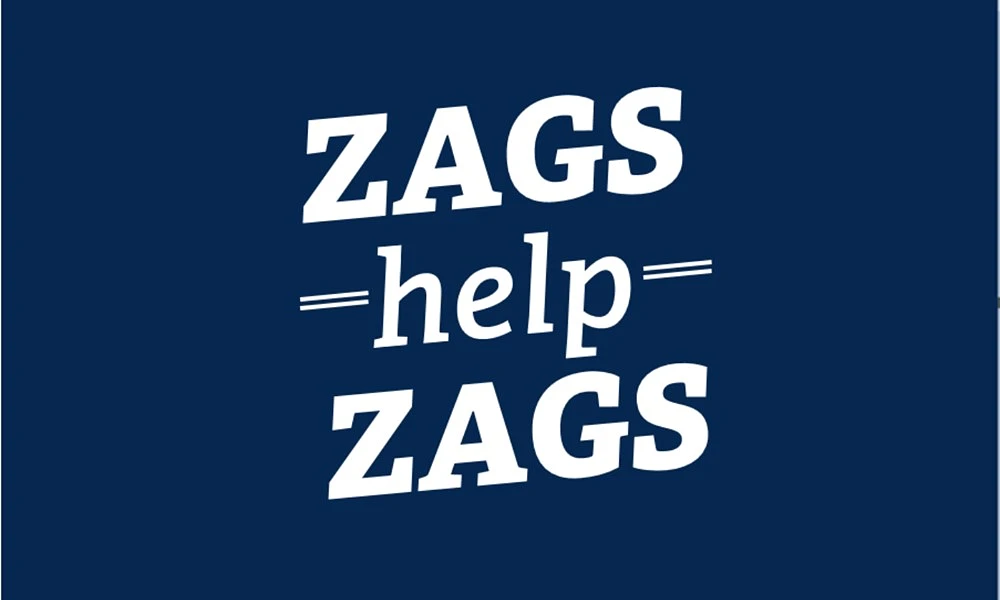By; Office of Health Promotion
Time and time again, when you ask students what they love about Gonzaga, they will say, “community.” Students talk about being part of a community where people care for and help one another, or “Zags Help Zags.” Zags Help Zags is the name of the bystander intervention program we have on campus. This program is about encouraging the Gonzaga community to both promote well-being and take action to prevent harm. We use the term bystander, which means any person who observes something, and has the choice to DO something. We want to share with you, as parents, families, and supporters of our Zags, the ways we encourage them to be active bystanders, and how you, too, are part of our Zags Help Zags experience here at GU.
At the collegiate level, bystander intervention programs often focus solely on the prevention of sexual assault and sexual harassment. While Zags Help Zags includes these issues, our bystander message is bigger, and aligns with our Jesuit ideal of being people for others. For us, Zags Help Zags helps create a campus environment of respect where students feel comfortable intervening in any situation where another may need help. Whether it be when someone has had too much to drink or needs to connect with a mental health professional, when a friend has started to hole up in their residence hall room or is posting concerning comments on social media, our Zags know how to help.
Zags Help Zags incorporates positive bystander intervention behaviors to prepare students to help in numerous situations. We use the CARE acronym to remind students of their options for action, encouraging them to do something, as opposed to nothing. They can select one or more of these strategies to use when intervening, keeping their health and safety (especially related to COVID-19 precautions) and whether or not they are the best person to respond, in mind:
- C- Create a distraction
- A - Ask directly
- R- Refer to an expert
- E- Enlist others to help
There are a few things that you, as parents and guardians, can do to support this culture of respect on campus and help your students thrive physically, mentally, and emotionally here at Gonzaga. A common thread in issues affecting the lives of college students can be linked to communication. Whether it is a lack of communication or miscommunication, the ways in which students are communicating with each other can lead to our students’ engaging in unhealthy and sometimes unwanted behaviors.
Encouraging your students to communicate with those around them, as well as modeling good communication within your own relationship, can be a great way to set your student up for success. Whether that means a conversation about their personal goals for during college and how to achieve them or having a conversation about boundaries and how to set them, and even more, how to ask someone about their boundaries and respect the answer. Talk about what a healthy relationship looks like, and the importance of staying true to one’s own personal values and beliefs. Encourage your student to be open and honest to their friends about what they want out of their time here at Gonzaga and the things they want to do to in order to reach their goals.
Sometimes this message of being a good bystander and helping others can be misinterpreted. Zags Help Zags means getting a student who is struggling with their mental well-being to a campus resource who can help; it does not mean being the sole support person for someone or keeping watch all night to ensure someone doesn’t hurt themselves. It means calling Campus Security or 911 when someone might be experiencing an alcohol emergency; it does not mean just trying to put them in a “safe” position and leaving them in a room while you return to a party. When a friend says they cannot concentrate while studying, it’s encouraging them to go for a walk or take a nap to help refocus rather than offering to share a prescription medication for ADD. Being a strong student actively involved on campus is the role where our students are experts. They are not experts in mental health, medical emergencies, or other circumstances. So, as one of the main people that our students will turn to for help, how can you support your student?
First, when your student tells you that they are worried about another student on campus, ask them what they have done with that information? Have they considered talking to a Resident Assistant in their hall, or to someone at the Center for Cura Personalis? Would they be willing to fill out a Refer form that would let CCP staff know that someone might be struggling so our professional staff on campus could find a way to check in with the student? Help them identify people who are experts who can help. Sometimes we have to remind our students that you want to be able to be someone’s friend, so it’s best to get them to someone who can serve in that counseling or helping role that they don’t have the training to do.
Second, it can be very draining to be that bystander. Sometimes finding ways to step in can draw on your emotions. Ask your student how they are feeling after the fact? What are they proud of? How will they feel about this in 24 hours? A week? A month? Encourage your student to reflect, and to consider seeking out their own support. Gonzaga’s Health & Counseling Services has staff who can help them talk through circumstances like this.
Next, if you know your student struggles, consider what resources on campus should be aware of this information and what services are available to help. It’s not appropriate for a roommate to feel like they should call you every time your student is struggling with mental health, not attending classes, or experimenting with drugs or alcohol. If you are concerned that your child may have a predisposition for any of these things or has demonstrated these things in the past, get in touch with one of our campus offices to share this information, talk about strategies to get ahead of challenges, and what resources are available to support your student.
Finally, if your student won’t or can’t take action on their own, you, as a parent or support person, may have your own Zags Help Zags moment. Can you call one of the offices on campus that could help you come up with some ways to help? Consider starting with New Student and Family Programs or the Center for Cura Personalis. Plenty of folks on campus want to help you help your student. Thank you for being a part of Zags helping Zags, and we wish you the best with the start of the fall semester!
Skip past news feed


